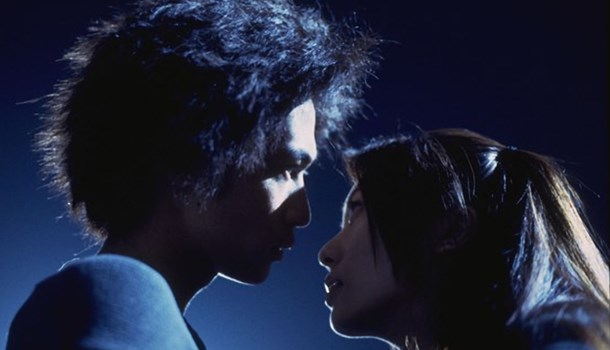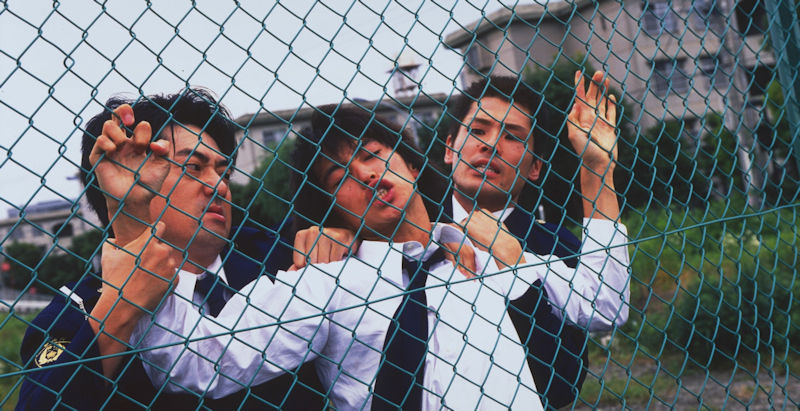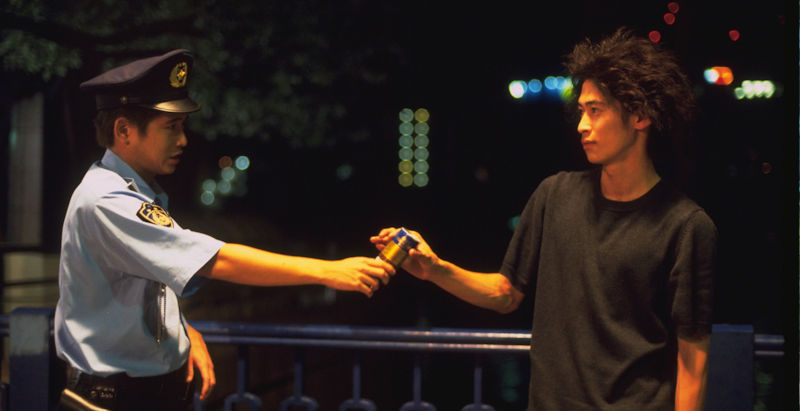
Written by Richard Durrance on 22 May 2023
Distributor Third Window FIlms • Certificate 15 • Price £17.99
As our protagonist, Sugihara reminds us throughout Isao Yukisada’s GO (2001), "this is my love story". Which is true as far as it GOes (sorry) but the pleasure of GO is that it is so much more than that, telling the story of a zainichi (Korean Japanese) called Sugihara (Yosuke Kubozuka), a delinquent outsider, his relationship with his Japanese mother (Shinobu Otake) and North Korean father (Tsutomu Yamazaki), his Korean friends and a burgeoning romance with a Japanese girl Sakurai (Kou Shibasaki), that may just lead Sugihara wanting to be more than he feels society is allowing him to be.
There’s a tremendous amount to unpack watching GO, because it takes in a variety of themes and weaves them together into a drama that covers love, bullying, violence, racism, delinquency, baked in social injustice, prejudice, social segregation, complex familial dynamics and the nature of friendship - you name it, GO likely touches upon it.
At its core though is the concept of the zainichi, the Korean resident alien, born and raised in Japan and yet not Japanese, part of its own apparently insular community that GO explores through Sugihara. Looking back it’s hard to think of almost a single scene in which Sugihara does not appear. There are fragmented moments where the film follows another character, but for the most part he is absolutely the crux of the narrative, but the beauty of GO is that Sugihara has emotional complexity enough to allow it to explore its themes without ever being heavy-handed. It also means that you are going to need a central performance that can hold the film together and Kubozuka gives one that is deserving of serious respect. As the film starts, he is in full delinquent mode, playing chicken with a subway train, then racing away from the police with his friends in a thrillingly energetic opening. Yet as the film progresses Sugihara becomes a more thoughtful character, questioning his place in society - here you can see in his performance the slow and subtle changes going on under the surface.
And that is the thing, GO can be thrillingly in your face at times, the beginning of the film especially with its dynamic editing, thumping soundtrack by Meyna Co. (dammit who did the music for The Most Terrible Time of my Life – which needs a UK release... you are listening Third Window! We need this film, at least I do. Anyway...), especially the scene in which Sugihara is bullied in a basketball court but fights back, in a melee of homemade violence, powered by an emotional howl of frustration at being ostracised for who he is. But to Sugihara who he is does not matter. He's Japanese. He’s Korean. He’s Sugihara. He has a right to be a person and not a racial epithet. Yet as the film unfolds its howls become more understated but just as strong - the real talent in storytelling and character development in GO is how Sugihara changes but remains the same person. His frustration internalises but becomes a sense of purpose more powerful than venting the violence of an outsider that leads nowhere.
Yet at the same time GO doesn’t just posit zainichi as being outcasts, at once unwanted and unclean, but recognising also a sense of self-isolation. GO unfolds often in flashback, so that you start to recognise, as the film progresses, how Korean Japanese society exists. Treated as resident aliens, Sugihara goes to North Korean school where speaking Japanese is viewed as sinful and even traitorous as is the desire to leave this violent atmosphere of cultural isolation and go to Japanese school where the potential for inclusion might be found, no matter how unlikely. The North Korean school is shown as being just as brutalising as the bullying encountered by Sugihara when he moves to a Japanese school, but it is different. Yet the movement between schools doesn’t mean he is culturally isolated from his zainichian friends, in fact as the film flows you start to realise how his social circles are almost uniquely Korean (excepting his mother and Sakurai).
However, GO isn’t so simplistic to suggest that because this North Korean school can be brutalising it is always so; some teachers encourage him to leave and become a societal bridge, while his fellow students and friends are fleshed out characters with their own aspirations or goals, or lack thereof, and in part show what Sugihara could be. The most intriguing of these is the quiet Jeong-il (Takato Hosoyamada), who becomes a catalyst for Sugihara recognising that he can be more than a delinquent, more than an outsider, even if Jeong-il's goals are different, wanting to change North Korean schooling from the inside.

Though it starts with racist bullying and shows the institutionalised social divide in Japan, one of the reasons the film is often so powerful is that the worst acts of prejudice, of casual racism are understated. This can be in small things like the reveal that it's not until he has become a teenager that Sugihara is eating for the first time in a Japanese home (note how his home is implicitly not a Japanese one regardless of geographical location), but is also reflected in how GO shows us the worst acts of casual, racially motivated violence, which the director allows to speak for themselves. The emotional impact is displayed with a straightforwardness that is important because it doesn’t try to impose itself on you, rather allows these acts to speak for themselves. If GO had gone more for the "big impact" moment each time, the nuance would be lost, especially in one key scene where the action that ends so tragically is so casually caused - it’s a child’s game that revolves around one person being seen as less of a human being, though the end result is never meant to be as it is.
But as Sugihara reminds us, this is his romance and, though that is true, there is as much of a focus on his family, in particular his mother and father, as there is on Sakurai. What becomes fascinating is the dynamics between these characters, how different they are and how they are allowed to develop. When we first meet his father he is violent in nature, beating Sugihara to a near pulp, something that happens several times and is accepted by Sugihara. This is, in part, because his father has taught him boxing from a young age to give him a space that is safe: the reach of Sugihara’s arms to punch away danger.
Yet their relationship is more complex than at first it might seem. It’s not an abusive father-son relationship - though there is a sense of the father’s frustrations at finding an identity. For example, he must become South Korean to go on holiday, with North Koreans being verboten, yet also he wants more for his son even if he struggles to articulate it. Sugihara’s mother floats in and out of their lives, leaving them but also loving them, and even though she is given less space in the film, always feels like a real person. You sense what she has likely had to give up to live with Sugihara’s father, being such an outsider in Japanese culture.
Then there is Sakurai, and I was surprised to an extent how much their relationship takes a backburner to investigating zainichi culture and the relationship to Japan, but ultimately that works in GO due to Sugihara’s relationship to the country he is born into, even if he is a resident alien. His changing mindset is reflected in how Sakurai relates to him, and in Sakurai the film gives us a figure that illustrates both the prejudice and the possibilities of a more united society. However, it will be one that takes emotional courage and can only be reached by looking at your own implicit racism and cultural assumptions.
GO has that great capacity to subvert expectation in small ways, like the moment the more relaxed Sugihara knocks over a policeman. It’s a scene that starts in a friendly way but there’s a sudden sense of everyday menace that causes Sugihara’s outburst of violence. Where the scene then goes is a surprise, and like all good scenes does so much more than you might at first realise. It educates us – quietly we recognise just how apart from Japanese society Sugihara is as a resident alien, how at risk he could be for casual imprisonment and why an apparently innocent question could move him to violence, but it also allows for an unusual moment of friendship and understanding, which is gently life affirming; the surprise moment of of casual acceptance because someone actually listens to Sugihara, reminds you how throughout the film Sugihara and his friends rarely come into contact with Japanese people in a way that isn’t either threatening or dismissive.
For all that, GO is a serious drama that makes serious points while also providing a lot of humour, enriched with humanity. It's also a story that provides hope. It may not come to any conclusions, but instead shows us various paths that can be taken, either by those who are subjected to prejudice or those that are afflicted by their own prejudices against others. Visually and tonally it’s also a deeply confident work, able to shift between moments of more kinetic dynamic delinquency and matching these to more thoughtful introspection by way of the changing scope of emotions felt by our characters as the film unfolds. It is never heavy-handed remaining understated in its more emotive moments to make it all the more affecting to watch. As far as I'm concerned there is little worse than a director signposting "The Great Emotional moment"; Yukisada never once patronises us like that but allows us to relate to GO on our own terms.
This is all helped by Meyna Co.’s music, which mirrors the tonal shifts in the film, from thumping energy to quietly emotional beats, yet at the heart of the film are the performances, and without a doubt Yosuke Kubozuka as Sugihara gives a superb performance that holds your attention through his time onscreen; you can sense in him the changes from violence to hope by way of understandable anger. You see how Sugihara is his own man in Kubozuka’s performance: he is not a nationality, he is person and takes others as they are (mostly). Tsutomu Yamazaki (the trucker in the great noodle western Tampopo) is arguably just as good as the North Korean father wanting more for his son, giving a gnarly, disgruntled performance that’s curiously sympathetic considering when we first meet him, he’s all bloody violence.
Reflecting on the film one day after first viewing, much of the resonant power comes from the universality of the themes. Yes, we may be looking at how a specific set of people are treated in Japan, but in how zainichi are resident aliens, treated as unequal by law, is there any difference with how Windrush immigrants who may have lived in the UK all their lives find themselves suddenly shipped off “back home"? Both are treated with inequality and disdain by a government that should be thinking about protection and inclusion and not "them and us".
The circumstances may be different, true, but the impact of this societal removal remains the same, particularly in how they affect lives of others. GO explores "otherness" through Sugihara, his friends, family and girlfriend to moving effects Admittedly, I think it could have shaved a little from its two-hour running time, but then I am suspicious of films that run almost exactly to two-hours.
But let me remind you again, this is Sugihara’s love story, a Romeo and Juliet tale with a positive ending that is earned by all, which suggests there is no reason for a divide. It may not be easy, it may take some forgiveness, but it is possible and better that we strive for a better outcome, because as GO shows us the opposite can be terrible and ruinous to society. No one is unaffected.
Watch the trailer here.

A moment of surprising kinship

Long-time anime dilettante and general lover of cinema. Obsessive re-watcher of 'stuff'. Has issues with dubs. Will go off on tangents about other things that no one else cares about but is sadly passionate about. (Also, parentheses come as standard.) Looks curiously like Jo Shishido, hamster cheeks and all.
posted by Richard Durrance on 02 Mar 2026
posted by Richard Durrance on 25 Feb 2026
posted by Richard Durrance on 12 Feb 2026
posted by Richard Durrance on 10 Feb 2026
posted by Richard Durrance on 07 Feb 2026
posted by Richard Durrance on 03 Feb 2026
posted by Richard Durrance on 27 Jan 2026
posted by Richard Durrance on 19 Jan 2026